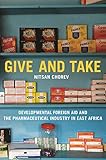Give and Take : Developmental Foreign Aid and the Pharmaceutical Industry in East Africa / Nitsan Chorev.
Material type: TextSeries: Princeton Studies in Global and Comparative SociologyPublisher: Princeton, NJ : Princeton University Press, [2019]Copyright date: ©2020Description: 1 online resource (320 p.) : 12 tablesContent type:
TextSeries: Princeton Studies in Global and Comparative SociologyPublisher: Princeton, NJ : Princeton University Press, [2019]Copyright date: ©2020Description: 1 online resource (320 p.) : 12 tablesContent type: - 9780691197852
- 9780691198873
- 338.9 23
- HC60
- online - DeGruyter
- Issued also in print.
| Item type | Current library | Call number | URL | Status | Notes | Barcode | |
|---|---|---|---|---|---|---|---|
 eBook
eBook
|
Biblioteca "Angelicum" Pont. Univ. S.Tommaso d'Aquino Nuvola online | online - DeGruyter (Browse shelf(Opens below)) | Online access | Not for loan (Accesso limitato) | Accesso per gli utenti autorizzati / Access for authorized users | (dgr)9780691198873 |
Frontmatter -- Contents -- Acknowledgments -- Acronyms -- 1. Foreign Aid in Comparative-Historical Perspective -- 2. Global Pharmaceuticals and East Africa -- 3. Kenya in the 1980s: International Origins of Local Production -- 4. Tanzania in the 1980s: The Limits of Limited Aid -- 5. Uganda in the 1980s and 1990s: The Missing Entrepreneurs -- 6. Kenya in the 2000s: Developmental Foreign Aid (1) -- 7. Tanzania in the 2000s: Developmental Foreign Aid (2) -- 8. Uganda in the 2000s: Entrepreneurship with and without Aid -- 9. Foreign Aid and the State -- Notes -- References -- Index
restricted access online access with authorization star
http://purl.org/coar/access_right/c_16ec
Give and Take looks at local drug manufacturing in Kenya, Tanzania, and Uganda, from the early 1980s to the present, to understand the impact of foreign aid on industrial development. While foreign aid has been attacked by critics as wasteful, counterproductive, or exploitative, Nitsan Chorev makes a clear case for the effectiveness of what she terms "developmental foreign aid."Against the backdrop of Africa's pursuit of economic self-sufficiency, the battle against AIDS and malaria, and bitter negotiations over affordable drugs, Chorev offers an important corrective to popular views on foreign aid and development. She shows that when foreign aid has provided markets, monitoring, and mentoring, it has supported the emergence and upgrading of local production. In instances where donors were willing to procure local drugs, they created new markets that gave local entrepreneurs an incentive to produce new types of drugs. In turn, when donors enforced exacting standards as a condition to access those markets, they gave these producers an incentive to improve quality standards. And where technical know-how was not readily available and donors provided mentoring, local producers received the guidance necessary for improving production processes.Without losing sight of domestic political-economic conditions, historical legacies, and foreign aid's own internal contradictions, Give and Take presents groundbreaking insights into the conditions under which foreign aid can be effective.
Issued also in print.
Mode of access: Internet via World Wide Web.
In English.
Description based on online resource; title from PDF title page (publisher's Web site, viewed 21. Jun 2021)


